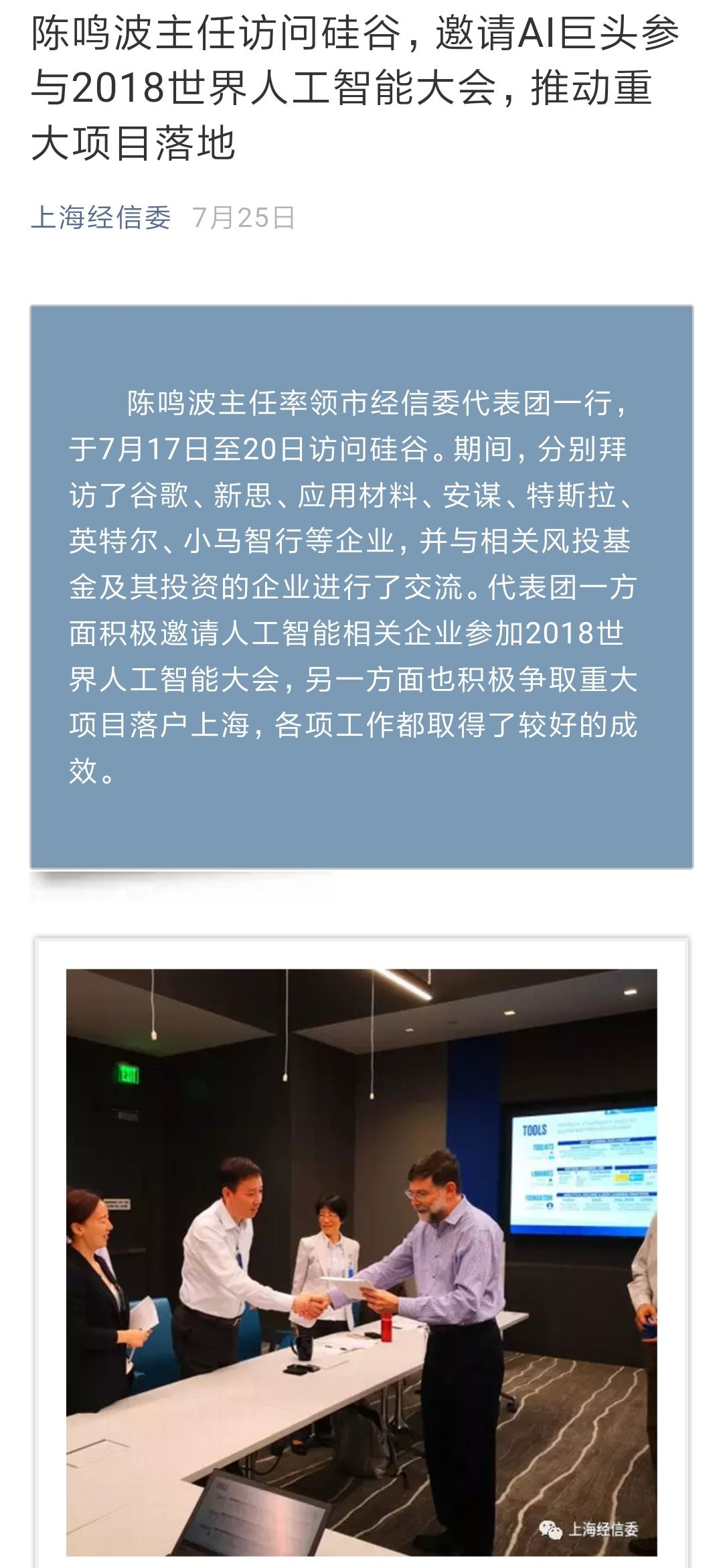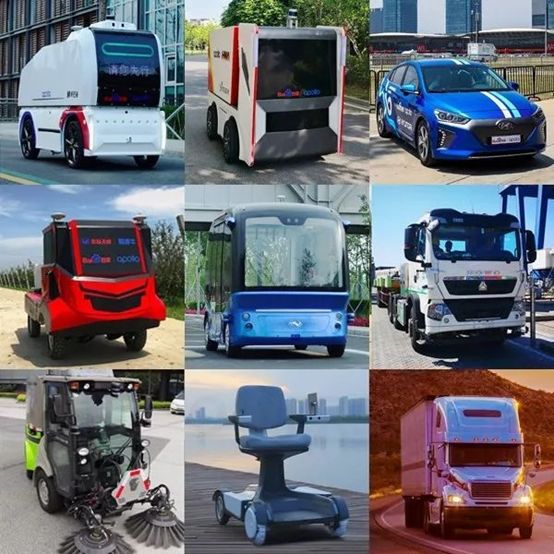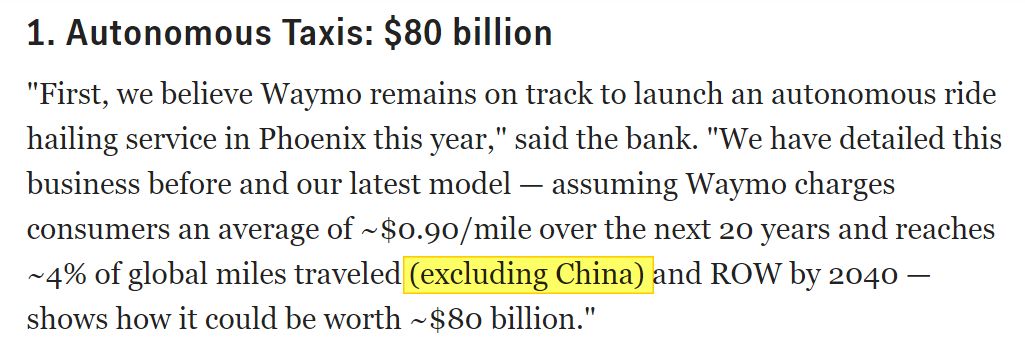Compared to other businesses that have been wasted for years, Alphabet’s self-driving subsidiary, Waymo, has entered China faster than expected.
On July 25th, an article titled “Director Chen Mingbo Visits Silicon Valley, Invites AI Giants to Participate in the 2018 World Artificial Intelligence Conference, and Promotes the Implementation of Major Projects” was posted on the WeChat official account of the Shanghai Economic and Information Commission.

The following statement about Waymo entering China was mentioned in the article:
Director Chen Mingbo highlighted the foundation of Shanghai’s industrial development and the direction of future key layouts in attracting major projects, hoping that relevant companies will further increase their investment and development in Shanghai.
Through active efforts, a consensus has been reached with a group of companies regarding the implementation of major projects. The delegation also tried riding autonomous vehicles, further confirming Shanghai’s determination to accelerate the development of autonomous driving technology and industry.
What is not known is that before this article, the Shanghai Economic and Information Commission also posted an article titled “Shanghai Economic and Information Commission Visits Silicon Valley: Striving for Google’s Self-Driving Cars and Other Major Projects to Settle in Shanghai.”
In the deleted article, the following statement about Waymo entering China was mentioned:
Director Chen Mingbo highlighted the foundation of Shanghai’s industrial development and the direction of future key layouts in attracting major projects, hoping that relevant companies will further increase their investment and development in Shanghai; analyzed the bottleneck problems faced in the process of implementing major projects and provided feasible operational paths.
Through efforts, consensus has been reached on Google’s Verily (biological) and Waymo (self-driving) projects, XinSi’s security software project, Applied Materials’ application innovation center project, Arm’s artificial intelligence innovation platform project, and the Xiaoma Zhixing headquarters project, which laid a foundation for the implementation of the next step of projects.
The delegation also took rides in Waymo autonomous vehicles, Baidu autonomous vehicles, and Xiaoma Zhixing autonomous vehicles. Waymo’s autonomous vehicle was widely acknowledged for its smooth and fluid riding experience, further confirming the determination to accelerate the development of autonomous vehicles.
Regarding Waymo, a foreign-funded company widely recognized in the industry as the fastest in commercializing autonomous driving, there is a subtle difference in the attitude presented by the Shanghai government regulatory department in the two articles. What is China’s true attitude at the regulatory level?
In fact, when Waymo entered China, a VP of a new car company expressed doubts on his friends’ circle: Advanced autonomous driving (cars) is essentially a real-time mapping system. Because of national security concerns, there are only four companies licensed by the domestic ZF. Will Waymo also need a license?Here, the license refers to the mapping qualification of high-precision autonomous driving maps, which needs to be approved by the National Administration of Surveying, Mapping and Geoinformation of China. As of now, there are a total of 14 companies that have obtained the license for navigation map collection and production. Except for the last four representatives from national/local governments, the rest are either map vendors who have already been in the automotive industry, or giants such as BAT, SAIC, and Didi. The competition for the qualification of high-precision map surveying and mapping is much fiercer than that of new car qualifications.
It is precisely because of the strong reliance on high-precision maps for future autonomous driving, a large number of foreign automotive giants such as Daimler, BMW, Ford, Honda, Hyundai, Jaguar Land Rover, etc. have joined Baidu Apollo’s autonomous driving ecosystem.
This is also why in CES 2018 at the beginning of this year, Lu Qi, the former CEO of Baidu and the general manager of Baidu’s Intelligent Driving Group, openly stated that “in the future, China’s high-precision map business may be even larger than Baidu’s current search business.”
Without the qualification for high-precision map surveying and mapping, this is a hurdle for Waymo to enter China.
So far, our country has not yet issued specific regulatory provisions for wholly foreign-owned enterprises engaged in autonomous driving research and development in China. Perhaps we can refer to the case of foreign cloud computing giants entering China.
Collaborating with local cloud vendors has become an inevitable model for foreign cloud computing giants to enter China, such as SAP + China Telecom, Oracle + Tencent, AWS + Halo New Network, Microsoft Azure + Century Internet, and even IBM + Wanda.
When interviewed, Ke Wenda, President of Cloud Blue Cloud of Century Internet, mentioned that there are two important foundations for China’s standardized laws on cloud computing: “First, the data must be controlled by Chinese companies, and second, the data cannot leave the country.”
Under the authorization and training of Microsoft, the Century Internet team spent about a year and a half in trial operation, making sure that all systems and regulations were fully compliant, including the segmentation of Azure and Office 365 in system architecture and foreign environments. It is precisely through these efforts that Microsoft’s intelligent cloud operated by Century Internet can “legally land, operate, and sell” in China.
As mentioned earlier, autonomous driving vehicles will continuously collect more sensitive road details data than cloud computing, and the regulatory requirements should not be lower than those of cloud computing.
Therefore, data collection and storage are the second hurdle for Waymo to enter China.Open the Baidu Apollo website, which lists 119 Apollo ecological partners. Of course, considering some hesitant manufacturers, this ecosystem has some exaggeration. However, the products launched by Apollo 3.0 for subdivided markets such as unmanned express delivery/takeaway vehicles, sweeping robots, and freight are about to commercialize and conduct trial operation.

This is the real difference caused by regional disparities. Waymo in the United States began to operate its autonomous driving fleet in Phoenix, Arizona, with friendly road and weather conditions, while gradually reaching cooperation with more and more different traffic segmented markets (retail giant Walmart, rental platform Avis, shopping mall DDR Corp, and Element Hotel, etc.). At the same time, we should also see that Baidu Apollo has almost no sign of ecological landing in the United States.
In other words, the players who operate in their home field have inherent advantages in the landing of the autonomous driving market. Considering differences in policies and regulations, culture, and market development, Apollo is difficult to land in the United States. Similarly, Waymo will not have an easy time in China.
On November 15, 2017, the Ministry of Science and Technology held the launching meeting for the Development Plan of New Generation Artificial Intelligence and announced that it would rely on Baidu to build a national new-generation artificial intelligence open innovation platform for autonomous driving. On the other hand, Morgan Stanley has recently raised Waymo’s valuation to $175 billion, giving a detailed explanation: autonomous driving taxi business $80 billion, logistics express business $90 billion, and technology licensing business $7 billion. Who noticed that the phrase “not including the Chinese market” in the UBS report?

The commercialization of the subdivided market cannot match the strength of local players, which is the third obstacle for Waymo to enter China.
Waymo can strengthen the competition intensity and accelerate commercialization in the domestic autonomous driving industry upon entering China, which is very positive. However, it is better not to be too optimistic about Waymo’s future revenue in the Chinese autonomous driving market.



This article is a translation by ChatGPT of a Chinese report from 42HOW. If you have any questions about it, please email bd@42how.com.
